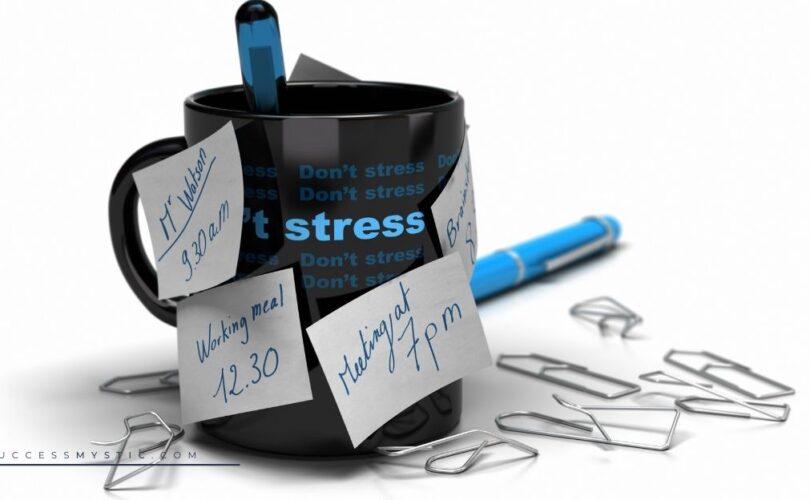In this article: What you don’t do matters as much as what you do!
More and more studies are showing us how chronically increased stress levels cause us to suffer physical, emotionally and spiritually. Stress can really kill! Stress is a major factor in heart disease including heart failure, sudden cardiac death, and heart enlargement.
Stroke, chronic fatigue, adrenal exhaustion, depression and anxiety, are all intimately connected to the psychological and emotional effects of chronic stress. Up to 90% of all initial visits to a family physician are due to underlying stress.
If we don’t learn how to manage our stress, it will definitely manage us, and be behind all manner of health problems. You probably are familiar with the fear, flight fight response the body uses to deal with emergency situations.
This is the acute stress response and is perfectly healthy in life or death situations. It works like this: Your pituitary gland produces and discharges adrenocorticotropic hormone (ACTH) into your bloodstream.
This then causes the release of two more hormones, epinephrine, and norepinephrine, a.k.a. adrenaline and noradrenaline, respectively. These come from the adrenal glands and also get released into the bloodstream. Their role is to prepare the body for emergency action. This means an increase in blood pressure, heart rate, blood sugars, and muscle tension, which occurs to help supply enough blood to your brain and musculoskeletal system.
This is fine as long as the stress is a true emergency. However, when the stress response remains active over the long-term, due to perceived threat, then serious health consequences ensue, and these can literally be deadly. It is our responses to work, finances, and relationships, which underlie the problem of ongoing stress.
There are many different ways we choose to cope with stress. Unfortunately, a lot of these can be deemed unhealthy coping mechanisms and serve only to exacerbate the situation further. If we allow stress to cause us to react negatively, to worry, to get angry or anxious, we only perpetuate the problem and make ourselves sicker in the long-run.
If we allow negative thinking to rule our minds, we will become more run down than ever, and the stress will continue to mount and get stored in our bodies, leading to more ill-health and problems with our well-being.
So, even though we may exercise and eat well, if we don’t address our negative responses to stress, which might include eating chips on the couch after we had a healthy green salad, or drinking too much alcohol even though we work out five times per week, then we only create more stress and end up sabotaging our best efforts.
Here are fifty-two ways on how NOT to manage your stress, and what you can do differently instead.
52 To-Don’ts Of Stress Management
- Don’t eat sugar all day because you need the “kick” to get everything done. This is not only pointless, as sugar wreaks havoc on blood sugar levels and so causes energy crashes and mood swings, it is simply a very unhealthy thing to do.
- Don’t work more than you relax. Remember that, “All work and no play makes Jack a dull boy.” Balance your work life with some downtime and some fun time. If you are a bit of a workaholic there is probably something else that you are avoiding facing.
- As with sugar, don’t drink 10 sugary drinks or ten cups of coffee to keep you going. Your adrenals will burn out and you will end up fatigued, after your blood sugars crash from too much sugar in your system. Sugar has been found to be as addictive as cocaine! Avoid sugar and caffeine and instead go for herbal teas or plenty of pure, fresh water.
- Don’t be a couch potato binging on hours of Netflix. You will become lethargic and your muscles will become slack as they atrophy. You will develop a bad habit that will be hard to break.
- Don’t snack on chips, cookies, and buttery popcorn. Go for healthy snacks like raw veggies and lo-fat dip. Preferably, avoid snacking at all and stick to three balanced, healthy meals per day.
- Don’t stay inside in a darkened room for days on end (some people do this!). You are not a vampire. Your body needs sunlight, fresh air, and exercise, on a daily basis, to be healthy. Draw back the curtains, open the windows, and let the fresh air and daylight in.
- Don’t drink alcohol. In the long run, it can damage your liver and it will dehydrate you, causing prematurely wrinkly skin, and possible liver disease. At least limit your consumption to within the recommended limits, and if possible, go T-total.
- Don’t stay up after 11 o’clock at night. Lack of sleep will exacerbate your stress levels. Aim for a healthy 8 hours per night. Ancient Chinese medicine claims that every hour of sleep before midnight is worth two hours after midnight.
- Don’t sleep through your alarm. This will make you late for work and you will start your day feeling stressed, rushed and irritable. Try to get up half an hour early and spend a few minutes breathing, stretching, or meditating. Give yourself enough time in the morning to wake up slowly. This will help you get started on a positive note.
- Don’t criticize yourself or others. Being judgmental causes a toxic internal environment. Instead, practice loving kindness, acceptance, and compassion. As the yogis tell us, the divine spark lives within everyone. Just as it lives within you, imagine when you meet others that you are honoring that divine spark within them. Treat all beings with respect, just as you treat yourself with respect.
- Don’t sweat the small stuff, as Richard Carlson’s book of the same name, tells us. Consider how important this stressful event will be five years from now. That should help you let go a bit! Try breaking things down into small, manageable chunks, to avoid feeling overwhelmed.
- Don’t take anything personally. Nothing is personal. Everyone lives life through their own personal lens. They can only see you and everything you do according to their own set of values and beliefs. Therefore, whatever they think of you or say about you, it can never actually be about you! It is never about you. Nothing in this life is personal.
- Don’t fall into patterns of negative thinking. Negative thinking pulls you down and can lead to serious depression. Practice positive affirmations instead. Positive thinking pulls you up into an upward spiral of ever more positive emotions, as researched in psychology. The more positive you can be, the more positive you will become.
- Don’t put everyone else before yourself. Contrary to our traditional western, puritanical thinking, it is NOT selfish to put yourself first. When your needs are met, you can take that much better care of those around you. Your cup must be overflowing first, and then you will have plenty to share with others. If you cup is empty due to adrenal exhaustion from chronic stress, having to give to others will only cause a build-up of bitterness and resentment. If you keep on giving even when there is nothing left to give, you will be running on empty and will make yourself sick. Therefore, put yourself first!
- Don’t beat yourself up. This only leads to more stress, negative thinking, and feelings of hopelessness. Catch yourself doing it, forgive yourself, let go of your own internal critic and practice being kind and gentle to yourself.
- Don’t let thoughts of panic or anxiety take over. This only makes your stress levels even higher. Try clapping your hands and saying’ “STOP!” next time you realize you are worried or anxious. This will immediately help break the cycle of negative thoughts. Then practice deep breathing to help calm your mind. Alternate nostril breathing or pranayama, is very beneficial.
- Don’t breathe into your upper chest. This is a sign the fear, flight fight response is active. In order to calm yourself, breathe into your belly, in slowly and out slowly. Gradually you will be more at ease and the relaxation response will be activated.
- Don’t allow yourself to get dehydrated. Drinking plenty of water throughout the day keeps you alert and your brain functioning optimally. Water is the best drink.
- Don’t get angry. Anger will flood your system with stress hormones. You will only end up feeling worse than ever. Try making a commitment to walk away and calm down next time you feel your blood boiling. Breathe, and surrender. Tell yourself, “In this moment, there is nothing I can do, except take care of myself.” Knowing that the problem will ultimately resolve itself, practice good self-care. Soothe yourself by placing one hand on your heart and breathing deeply. Let go of that need to be in control.
- Don’t smoke! Smoking can give you lung cancer, so obviously it’s going to add to your stress levels. It has been discovered that the “benefits” derived from smoking are mostly due to the deep inhalation of AIR, not smoke! So…practice that deep breathing instead, and quit the nicotine.
- Don’t isolate yourself from others. If you start to feel uptight, call a friend. A problem shared is a problem halved. Connecting with valued friends can help dissolve your stress. Find ways to build community into your life. Volunteer or join a club or group.
- Don’t eat that entire batch of chocolate brownies. It may feel great while you are in the process but afterwards you will get that sugar crash, you will gain weight and inches and you will feel remorse and guilt! Is it really worth it?
- Don’t ignore the stress. Don’t be in denial and act as if nothing is wrong. Don’t think if you just keep pushing through, all the stress will go away. It won’t. Try more proactive steps instead. Acknowledge your feelings, be compassionate towards yourself, and then take action to make positive changes.
- Don’t overanalyze a situation. If your brain is going round and round like the laundry in a washing machine, then you are overthinking a problem. Catch yourself, stop doing that, make a decision and then stick to it. Really, there is no right or wrong decisions in life, there is just life.
- Don’t bottle up your feelings. This is a guaranteed way to build the pressure up inside of you. It is imperative that you find ways to express your feelings: talk to a friend, speak your mind, and stand up for yourself. Consider journaling, painting, dancing, or singing; anything that helps you express how you are really feeling is going to be beneficial.
- Don’t hold a grudge. Holding a grudge is a negative stance, which only builds up stress and resentment inside of you. Much better to address the issue, express your feelings and look for win-win solutions. Forgiveness of others has been found to help you feel better within yourself.
- Don’t be a doormat. It is easy to let others push you around, especially if you secretly feel “less than” those around you. Of course, that is not true! You are just as worthy as the next person. Remember that your time is as valuable as theirs is.
- Don’t procrastinate. It is easy to put things off but this just builds up stress as you have a mental to do list which is getting longer and longer. Make a start. Tell yourself, “Just ten minutes,” of a task you don’t want to do. You will find the ten minutes becomes an hour before you know it. Just get started and you will feel better right away.
- Don’t try to be perfect. Nobody is and this is simply an impossible expectation to have of yourself. Don’t pile that kind of stress onto your own shoulders. Give yourself a break and let go a little bit.
- Don’t absorb other people’s stress. If you hang out with negative people, their attitude will inevitably rub off on you. Your brain actually can read their body language and mimic their stress. So, find friends who have a positive outlook. Surround yourself with kind, good-hearted people and let their attitude rub off on you!
- Don’t work yourself into the ground. It is easy to forget to have fun and relax when you are bombarded with deadlines and to-do lists. However, everybody needs a break and you need to practice self-care to keep yourself healthy and fit so you can continue to work.
- Don’t try to control everything. As the Buddhists say, “relax, nothing is under control”! Since we ultimately have no control (we are all going to die one day), we might as well relax and enjoy the ride.
- Don’t catastrophize. Catastrophizing is imagining the worst is going to happen. It usually doesn’t. If you catch yourself doing this, realize that it is a form of unrealistic and unhelpful thinking.
- Don’t think in black and white. Learn to see the shades of grey and to view any situation from all angles. This can help with problem solving, and understanding others.
- Don’t try to do too much. This is a sure-fire way to increase your stress levels. Learn to cut back, do less, pace yourself, and go slow. You will end up accomplishing the same in the end.
- Don’t lie. This only adds to your inner tension and bad feelings about yourself. Honesty is the best policy. You will feel lighter and avoid feelings such as guilt and shame which are stress-inducing.
- Don’t worry. Worry never solved a thing. It increases your stress levels. Worry is obsessing about the future. The future hasn’t happened yet. Practice staying in the present moment. Focus on the task at hand. Give it all your attention. Your worry will dissolve.
- Don’t live in the past. Living in the past is another way you avoid living in the present moment. It makes life way more stressful than it needs to be. When you stay in the present moment your stress levels automatically reduce, studies have found.
- Don’t grind your teeth. Grinding your teeth is certainly a response to stress, but not a very healthy one. Try gently rotating your jaw to release the tension it holds. Try massaging the tempero-mandibular joints, the indentations between your ears and your cheeks. Otherwise, you will actually grind down your teeth; then you will have a huge dental bill and your stress levels will probably soar.
- Don’t be a pessimist. Having negative thoughts is part of feeling stressed; it can also be a symptom or a cause of depression, so it’s best to nip those unhappy thoughts in the bud. Each time you notice you are having an unhappy thought, change it into a positive one. Practicing gratitude can help with this.
- Don’t judge others. Remember that you never know what another person has been through or is going through. Before you judge them, try trading places with them and wonder how they might be feeling. Know that everybody is struggling, and that everyone wants to feel happy and loved.
- Don’t let others pressure you. Stand your ground. Learn your boundaries and your limits. You have the right to say, “No,” and it is okay to do so. Remember that you are not responsible for other people, nor are you responsible for their reactions. If they react badly when you resist their pressure, it has more to do with them than it has to do with you.
- Don’t take yourself so seriously. When you get some perspective on how insignificant you are in terms of universes and galaxies, it becomes much easier to lighten up and loosen up. Everyone has choice. You can choose to be stressed because everything is so serious, or you can choose to be light-hearted and free, because you make life about laughter and joy. Laughter is known to lift your spirits and boost your mood. Laughter yoga is a great medicine.
- Don’t get too caught up in the details. This can cause unnecessary distress and hours of wasted time and work. Being too focused on the details may be a symptom of perfectionism. It is time to let go, lean back, and just breathe.
- Don’t try to be a superhero and do it all alone. This is how you end up overloaded and burnt out. Learn to delegate and ask for help. It is gracious to receive and gives others the opportunity to contribute.
- Don’t blame others. Blame is really just a perspective left over from childhood. Children blame others because they have not learned how to take responsibility for their own actions. If you find yourself blaming others, consider honestly, what part did you play in the situation? And what could you do differently next time, to maintain your own integrity in the circumstances?
- Don’t keep your to do list in your head. Make lists! And cross each item off as you complete it. This will give you a feeling of accomplishment and productivity.
- Don’t be a people pleaser. You can’t please everybody all of the time and if you try, you will be the one to suffer in the end. People will know you are a soft touch and they will start to take advantage of you.
- Don’t expect everybody to like you. You can’t make other people like you. Either they do or they don’t. What you can do is improve your relationship with yourself. Learn how to love and like yourself. When you truly accept yourself, you are less likely to worry whether others like you or not. You can be yourself and if people like you, great. If they don’t you will know it is their loss because you know deep down that you rock!
- Don’t expect to have everything done now. Remember that Rome was not built in a day. You can only do things one-step at a time. Trying to do it all now leads to failure. Practice patience, trust, and letting go.
- Don’t do, be. If you are constantly run off your feet, it is a sign you need to be doing less, and being more. Sit, breathe, and let go. From a relaxed place, you will be able to accomplish more.
- Don’t complain. Being negative only adds to stress levels, as the experts have shown. A practice of gratitude is the perfect antidote. Not only does it help you feel happier, but it brings you more into the present moment, that place where we can find well-being and peace.
Final Thoughts
Knowing what not to do is just as important as what to do when it comes to managing stress. Learning to eliminate those self-destructive habits is as much a part of stress management as adding in some new, healthy behaviors that encourage you to relax, have fun, and be yourself, placing yourself higher on your list of priorities, and making your self-care regime as important as your self-esteem.
Learning how NOT to overdo it, how to be kind to yourself instead of criticizing yourself, how to say, “No,” instead of being the people-pleasing doormat, are all-important in switching off the adrenaline and turning on the relaxation response.
Staying hydrated, avoiding sugars and simulants and associating with positive people are better de-stressors than their “Not-to” counterparts: Don’t drink too much caffeine or sugary drinks and don’t hang out with complainers, as they will pull you down. All in all, finding balance is key.
A balanced life filled with positive behaviors is what you do want; healthy coping mechanisms will help to turn off the stress response. Being a couch potato, eating chips and drinking pop may feel like you are avoiding stress, but in reality you are only exacerbating it. Hiding in your room with your curtains drawn may feel like an escape, and it is; however, it is not proactively addressing your stress levels it is only compounding them.
Nature walks, fresh air, and exercise all help to keep your stress levels down while lifting your mood and making you healthier on all fronts: Physical, emotional and spiritual. Keep your boundaries clear by learning how to say, “No” and don’t be a doormat. Forgive others, and let go of perfection.
Don’t waste hours thinking and worrying about the future or the past. Try to stay present and live in the now. It really is all we have. We can’t control life, but we can control our reactions to it.
By modifying our responses, by being more often and doing less often, we can build our “inner peace” muscle and make it strong, so we can remain resilient in the face of the greatest adversities. Stress management is a life long journey of learning and growth, and it takes shedding a number of old habits, which simply do not serve us. Learn to practice the positive responses to stress and draw on a wide variety of tools to help maintain your inner equilibrium.
Accept others and don’t judge them; find peace within yourself through forgiveness, and practice mindfulness, meditation, affirmations, and relaxation techniques.
Stay positive, change your limiting and negative beliefs through positive affirmations and remember to laugh, have fun, and say connected to others.
Be grateful for all the wondrous blessings you do have and give thanks multiple times each day.
Disclaimer: This publication is for informational purposes only and is not intended as medical advice. Medical advice should always be obtained from a qualified medical professional for any health conditions or symptoms associated with them. Every possible effort has been made in preparing and researching this material. We make no warranties with respect to the accuracy, applicability of its contents or any omissions.







